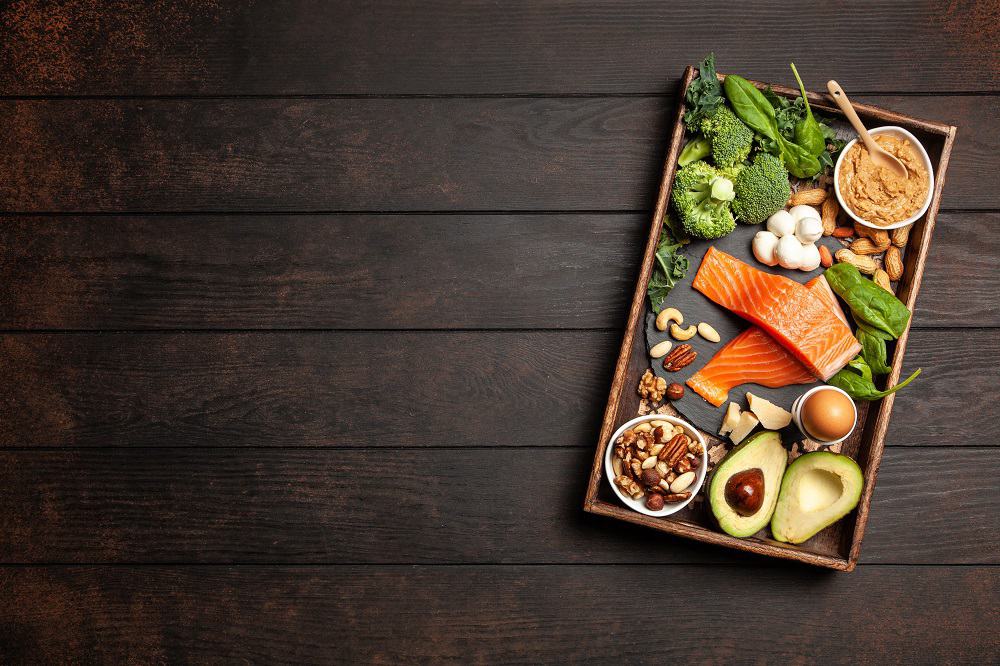What is Keto and how can it benefit you?

- It requires that you restrict carbohydrates to fewer than 20 to 50 grams per day (for reference a medium-sized banana has about 27 grams of carbs).
- It typically takes a few days to reach a state of ketosis.
- Eating too much protein can interfere with ketosis.
Because the keto diet has such a high fat requirement, followers must eat fat at each meal. In a daily 2,000-calorie diet, that might look like 165 grams of fat, 40 grams of carbs, and 75 grams of protein. However, the exact ratio depends on your particular needs. Some healthy unsaturated fats are allowed on the keto diet — like nuts (almonds, walnuts), seeds, avocados, tofu, and olive oil. But saturated fats from oils (palm, coconut), lard, butter, and cocoa butter are encouraged in high amounts. Protein is part of the keto diet, but it doesn’t typically discriminate between lean protein foods and protein sources high in saturated fat such as beef, pork, and bacon.
What about fruits and vegetables? All fruits are rich in carbs, but you can have certain fruits (usually berries) in small portions. Vegetables (also rich in carbs) are restricted to leafy greens (such as kale, Swiss chard, spinach), cauliflower, broccoli, Brussels sprouts, asparagus, bell peppers, onions, garlic, mushrooms, cucumber, celery, and summer squashes. A cup of chopped broccoli has about six carbs.
While there has been some criticism of the keto diet due to potential health issues, these can be monitored and managed by being sure to consume plenty of low carb vegetables as well as supplementing with vitamins and minerals to ensure you are getting in your recommended daily intake of micronutrients.
An interesting effect of the keto diet is the way in which it reduces cravings.bHunger cravings tend to be one of the worst side effects of dieting.In fact, its one of the main reasons why many people feel miserable and eventually give up! However, low-carb eating leads to an automatic reduction in appetite as reported in this study: https://pubmed.ncbi.nlm.nih.gov/17228046/
So basically dieting without feeling like you’re starving yourself – win/win!
Not all fat in your body is the same. Where fat is stored determines how it affects your health and risk of disease. The two main types are subcutaneous fat, which is under the skin, and visceral fat, which accumulates in your abdominal cavity and is typical for most overweight men.
Visceral fat tends to lodge around your organs. Excess visceral fat is associated with inflammation and insulin resistance – and disturbs metabolic dysfunction. Low-carb diets are very effective at reducing this harmful abdominal fat. In fact, a greater proportion of the fat people lose on low-carb diets seems to come from the abdominal cavity which is great news for many of us struggling with ‘problem areas.’ Over time, keto style eating should lead to a drastically reduced risk of heart disease and type 2 diabetes.
High-density lipoprotein (HDL) is often called the “good” cholesterol. The higher your levels of HDL relative to “bad” LDL, the lower your risk of heart disease. One of the best ways to increase “good” HDL levels is to eat ‘healthy’ fats – and low-carb diets include a lot of fat. It is, therefore, unsurprising that HDL levels increase dramatically on healthy, low-carb diets, while they tend to increase only moderately or even decline on low-fat diets.
Elevated blood pressure, or hypertension, is a significant risk factor for many diseases, including heart disease, stroke and kidney failure. Low-carb diets are an effective way to lower blood pressure, which should reduce your risk of these diseases and help you live longer.
Your brain needs glucose to function effectively, as some parts of it can only burn this type of sugar. That’s why your liver produces glucose from protein if you don’t eat any carbs.
Yet, a large part of your brain can also burn ketones, which are formed during starvation or when carb intake is very low. This is the mechanism behind the ketogenic diet, which has been used for decades to treat epilepsy in children who don’t respond to drug treatment. Very low-carb and ketogenic diets are now being studied for other brain conditions as well, including Alzheimer’s and Parkinson’s disease.
